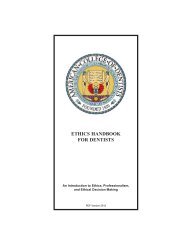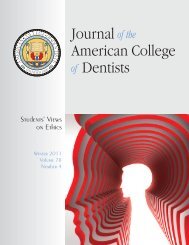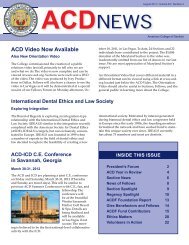JACD 71-4 - American College of Dentists
JACD 71-4 - American College of Dentists
JACD 71-4 - American College of Dentists
- No tags were found...
Create successful ePaper yourself
Turn your PDF publications into a flip-book with our unique Google optimized e-Paper software.
Issues in Dental Ethics<br />
54<br />
The doctor-patient<br />
relationship is at the heart<br />
<strong>of</strong> the dentist’s work.<br />
<strong>Dentists</strong> must nurture this<br />
relationship and protect it.<br />
Even keep it sacred.<br />
We all need guidelines in order to<br />
keep moving in the right direction.<br />
There are many sources from which a<br />
dentist can receive personal and pr<strong>of</strong>essional<br />
guidance on how to live. What<br />
follows are eight guidelines that are not<br />
only appropriate at the moment when<br />
students begin to practice in the clinic,<br />
but are appropriate throughout a career<br />
in health care. For that reason, they are<br />
<strong>of</strong>fered here as “White Coat Principles,”<br />
with the hope that, whenever dentists<br />
put on the white coat (or whatever<br />
mantel they wear in practice), these<br />
principles will come to mind again.<br />
Principle 1: Patient Care is<br />
the Point<br />
The first principle may seem too obvious<br />
or transparent to mention, but it is<br />
actually important enough to be listed<br />
first. The whole point <strong>of</strong> doctoring is to<br />
provide excellent and appropriate health<br />
services to other human beings who<br />
cannot do so for themselves. Motivations<br />
such as money, a fine car, convenience <strong>of</strong><br />
practice, and a pr<strong>of</strong>essional’s reputation<br />
among colleagues are secondary to this<br />
overarching responsibility to patients.<br />
When a dentist graduates from dental<br />
school, he or she possesses a very special<br />
set <strong>of</strong> skills, rare and important. These<br />
are skills that internists, neurologists,<br />
attorneys, astronauts, senators, even<br />
psychologists do not possess, and the<br />
dentist has a duty to share these skills<br />
and the benefits they produce with<br />
others who are in pain, with people who<br />
do not understand their own oral health<br />
or the health <strong>of</strong> their children, and with<br />
some who do not have much money.<br />
Our community counts on dentists to<br />
take care <strong>of</strong> those who need dental care.<br />
This principle is not abstract. Not<br />
long ago I returned from a trip to the<br />
East Coast, where I was asked to help<br />
with a dental practice overwhelmed<br />
with patients. The exhausted dentist,<br />
who has been in his community for<br />
twenty-five years, cannot convince even<br />
one <strong>of</strong> the other fifty local dentists to<br />
take on a Medicaid or indigent patient.<br />
No other dentist in his tri-county area is<br />
even willing to serve on the local hospital<br />
staff to take dental emergencies. This<br />
state <strong>of</strong> affairs is baffling and heartbreaking.<br />
In my view, real doctors keep<br />
their commitment to patients in need.<br />
Principle 2: The Doctor-Patient<br />
Relationship<br />
A noted pr<strong>of</strong>essor calls dentistry “a people<br />
business.” He tells the sad story <strong>of</strong> a<br />
patient who asked him about dental<br />
school, mentioning that her best friend’s<br />
son would be a terrific dental student<br />
and dentist. When the faculty members<br />
asked what it was that led her to think<br />
this, the woman stated, “Oh, he spends<br />
all <strong>of</strong> his time alone in his room, building<br />
model airplanes.”<br />
I would even go so far as to assert<br />
that dentistry is a “relationship business.”<br />
The doctor-patient relationship is at the<br />
heart <strong>of</strong> the dentist’s work. Little <strong>of</strong> value<br />
takes place without that relationship, and<br />
it is the vehicle for dental practice and<br />
especially for dental care. <strong>Dentists</strong> must<br />
nurture this relationship and protect it.<br />
Keep it sacred, even. This special relationship<br />
has healing qualities which have<br />
been documented by empirical research.<br />
One could easily squander its powers.<br />
Entering the dental pr<strong>of</strong>ession entails a<br />
commitment to put the relationship to<br />
work and to treat each patient as if he or<br />
she were the most important person in<br />
the world at that moment in time.<br />
Principle 3: Discuss Options<br />
and Possibilities<br />
The days <strong>of</strong> paternalistic doctoring are<br />
clearly on the wane. Patient autonomy is<br />
a core element <strong>of</strong> modern ethical and<br />
successful practice in our society.<br />
2005 Volume <strong>71</strong>, Number 4





